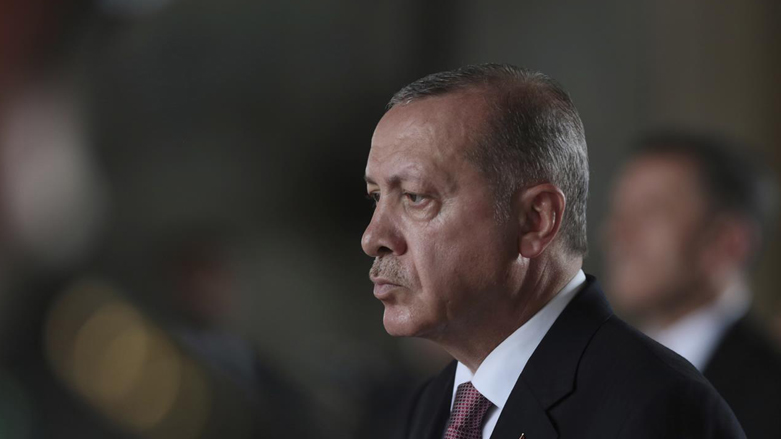Pence, Pompeo warn Turkey, as do US Congressmen

WASHINGTON DC (Kurdistan24) – In an unusual rebuke to Ankara, US Vice-President Mike Pence and Secretary of State Mike Pompeo issued strong warnings about Turkey’s planned purchase of the S-400, as well as its repeated threats to attack northeastern Syria.
The US warnings came on Wednesday, as Turkish Foreign Minister Mevlut Cavusoglu was in Washington to attend the 70th anniversary of the founding of the North Atlantic Treaty Organization (NATO).
Pence, speaking at “NATO Engages,” a day-long conference heralding the NATO Foreign Ministers meeting the following day, cautioned Ankara about proceeding with its repeatedly stated intent to acquire the S-400.
“The Pentagon made clear, earlier this week and I repeat today: if Turkey completes its purchase of the Russian S-400 missile system, Turkey risks expulsion from the joint F-35 program,” Pence said.
That “will harm not just Turkey’s defense capacity,” he warned, “but it may cripple many of the Turkish component manufacturers that supply that program.”
“Turkey must choose,” the Vice-President continued. “Does it want to remain a critical partner in the most successful military alliance in history, or does it want to risk the security of that partnership by making reckless decisions that undermine our alliance?”
Turkey must choose. Does it want to remain a critical partner in the most successful military alliance in history or does it want to risk the security of that partnership by making such reckless decisions that undermine our @NATO alliance?
— Vice President Mike Pence (@VP) April 3, 2019
Earlier that day, at the same conference, Cavusoglu had, once again, affirmed Turkey’s intention to purchase the S-400.
“It’s a done deal,” Turkey’s Foreign Minister affirmed. “We will not step back,” he said, asserting, “Turkey doesn’t have to choose between Russia and any others.”
Several hours later, however, Pence stated the opposite.
Later on Wednesday, Cavusoglu met with Pompeo, who “expressed support for ongoing negotiations regarding northeast Syria,” while he warned “of the potentially devastating consequences of unilateral Turkish military action in the region,” according to a State Department readout of the meeting.
Pompeo also expressed “his concerns” about Turkey’s “potential acquisition” of the S-400, while he complained about Ankara’s arrest of US citizens, urging a “swift resolution” of those “cases involving unjustly detained” Americans.
Somewhat remarkably, the Turkish Foreign Ministry then issued a statement disputing the State Department account, claiming the US summary was “obviously prepared before the meeting,” while it “fails to reflect the content of the meeting,” and “contains matters that were not even raised.”
Yet a third meeting Cavusoglu held on Wednesday also spoke to the increasingly strained relations between Ankara and Washington.
The Chairman of the House Foreign Affairs Committee, Rep. Eliot Engel (D, New York), and the committee’s senior Republican, Rep. Michael McCaul (R, Texas), met with Cavusoglu.
Like Pence and Pompeo, the congressmen cautioned Cavusoglu about Turkey’s planned S-400 purchase—and they did so in language that echoed Pence’s warning that Ankara could be risking its NATO status.
Describing the meeting with Cavusoglu as “frank,” a statement from the Foreign Affairs Republican Press Office explained that the congressmen “made clear our opposition to Turkey’s plan to acquire the Russian-made S-400 missile system,” adding that it “could jeopardize Turkey’s participation in the Trans Atlantic alliance.”
Turkey’s government “must choose to demonstrate its continued commitment to the NATO alliance,” the congressmen warned.
However, Dr. Aykan Erdemir, a former Turkish parliamentarian and now a senior fellow at the Foundation for Defense of Democracies, advised Kurdistan 24 that Ankara appeared unmoved.
“It seems that the Turkish government still thinks” it can manage “to acquire the S-400, while also remaining within the F-35 project,” Erdemir said.
Erdemir stressed that the S-400 was not just an issue between the US and Turkey, as he noted that the first question from the audience to Cavusoglu came from a Polish military attache who asked if there were any “red lines” in Turkey’s defense cooperation with Russia.
“I think the question shows that there are growing concerns among other NATO countries about Turkey’s deepening defense cooperation with Russia,” Erdemir said, and they see it “as a risk” to their own security.
Asked if Turkey might be jeopardizing its participation in NATO, Erdemir thought it unlikely but suggested there could well be “an erosion of trust” between Turkey and other NATO countries if Ankara proceeds with the S-400 purchase.
“Turkey would still remain a NATO member,” Erdemir suggested, “but it would not have the same level and quality of defense cooperation with other members, as it used to have.”
Turkey has a long history of conflict with Russia, but Erdemir did not think complacency explained Ankara’s growing ties with Moscow. Rather, this seemed to be what Turkish President Recep Tayyip Erdogan wanted.
“Turkey’s Islamist-rooted Justice and Development Party (AKP) has taken repeated steps” with the aim “to socially engineer a new Turkish society,” Erdemir said, and it has sought “to pivot Turkey away from the trans-Atlantic alliance and its values.”
“The current trend” is “a dangerous trend for the Turkish people, as well as for NATO,” Erdemir concluded, noting that except for Erdogan’s first few years in office, he “has always been anti-Western.”
Editing by Nadia Riva
